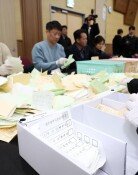‘Santa Claus pledges’ should be removed
‘Santa Claus pledges’ should be removed
Posted March. 08, 2022 07:57,
Updated March. 08, 2022 07:57
With Russia’s invasion of Ukraine, the world is quickly being pulled into a new cold war. Following high-level financial sanctions, the U.S. is considering an embargo on crude oil from Russia, escalating conflicts between the Western countries and Russia. South Korea will not be able to avoid a test of diplomacy and security as a tension between the U.S. and Russia increases following conflicts between the U.S. and China.
International politics at the moment are highly volatile due to reasons unprecedented in modern history. Russia is attacking nuclear power plants and threatening nuclear war. Its implications are spreading across all areas, including the economy and society. Russia and China will become close to each other, threatening the international order of liberalism. On the other hand, tensions between them and the U.S., which is uniting with the anti-China and anti-Russia alliances, are likely to grow. In the midst of chaos, North Korea is raising its level of provocation by launching missiles nine times this year alone. The country seems to be poised to develop nuclear weapons and launch ICBMs.
South Korea’s diplomatic capabilities and security posture to respond to such a situation are concerning. Trust with the U.S., a key ally of the country, has been on shaky ground for the past five years and the country’s relations with Japan are at the worst. South Korea may be excluded from the anti-China united fronts in the Indo-Pacific region led by QUAD and AUKUS. The defense capability of the ROK-U.S. Forces has also worsened due to the reduction and postponement of joint military exercises. Whoever becomes the next president, he or she should overcome such failures of the current administration and lead diplomatic policies.
Presidential candidates Lee Jae-myung and Yoon Seok-yeol are each claiming that they are the right candidate to deal with the situation by putting forward ‘peace’ and ‘deterrence through power,’ respectively. However, some of their pledges are unfeasible or not detailed enough. Lee’s pragmatic diplomacy can be a risky balancing act, which will put off all of the U.S., China, and Russia. Yoon’s hardline stance to attack North Korea first can lead to heightened tensions and worsened relationship between the two Koreas from the beginning. Yoon has not provided a concrete answer to when and where additional THAAD will be deployed and what benefits it will bring.
Unlike other similar pledges the two candidates proposed competitively, their diplomacy and security pledges have clear differences in their approaches. Who becomes the next president will bring largely different outcomes. Policies toward not only North Korea but also four major countries – the U.S., China, Russia, and Japan – are directly related to South Korea’s security. It is voters’ responsibility to analyze the broad directions and details of the candidates’ pledges as people who hold the fate of the Korean Peninsula.







